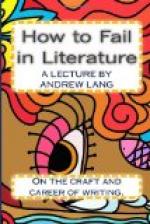ONLY.
Only a spark of an ember,
Only a leaf on
the tree,
Only the days we remember,
Only the days
without thee.
Only the flower that thou worest,
Only the book
that we read,
Only that night in the forest,
Only a dream of
the dead,
Only the troth that was broken,
Only the heart
that is lonely,
Only the sigh and the token
That sob in the
saying of Only!
In literature this is a certain way of failing, but I believe a person might make a livelihood by writing verses like these—for music. Another good way is to be very economical in your rhymes, only two to the four lines, and regretfully vague. Thus:
SHADOWS.
In the slumber of the winter,
In the secret
of the snow,
What is the voice that is crying
Out of the long
ago?
When the accents of the children
Are silent on
the stairs,
When the poor forgets his troubles,
And the rich forgets
his cares.
What is the silent whisper
That echoes in
the room,
When the days are full of darkness,
And the night
is hushed in gloom?
’Tis the voice of the departed,
Who will never
come again,
Who has left the weary tumult,
And the struggle
and the pain. {5}
And my heart makes heavy answer,
To the voice that
comes no more,
To the whisper that is welling
From the far off
happy shore.
If you are not satisfied with these simple ways of not succeeding, please try the Grosvenor Gallery style. Here the great point is to make the rhyme arrive at the end of a very long word, you should also be free with your alliterations.
LULLABY.
When the sombre night is dumb,
Hushed the loud chrysanthemum,
Sister, sleep!
Sleep, the lissom lily saith,
Sleep, the poplar whispereth,
Soft and deep!
Filmy floats the wild woodbine,
Jonquil, jacinth, jessamine,
Float and flow.
Sleeps the water wild and wan,
As in far off Toltecan
Mexico.
See, upon the sun-dial,
Waves the midnight’s misty
pall,
Waves and wakes.
As, in tropic Timbuctoo,
Water beasts go plashing through
Lilied lakes!
Alliteration is a splendid source of failure in this sort of poetry, and adjectives like lissom, filmy, weary, weird, strange, make, or ought to make, the rejection of your manuscript a certainty. The poem should, as a rule, seem to be addressed to an unknown person, and should express regret and despair for circumstances in the past with which the reader is totally unacquainted. Thus:
GHOSTS.




